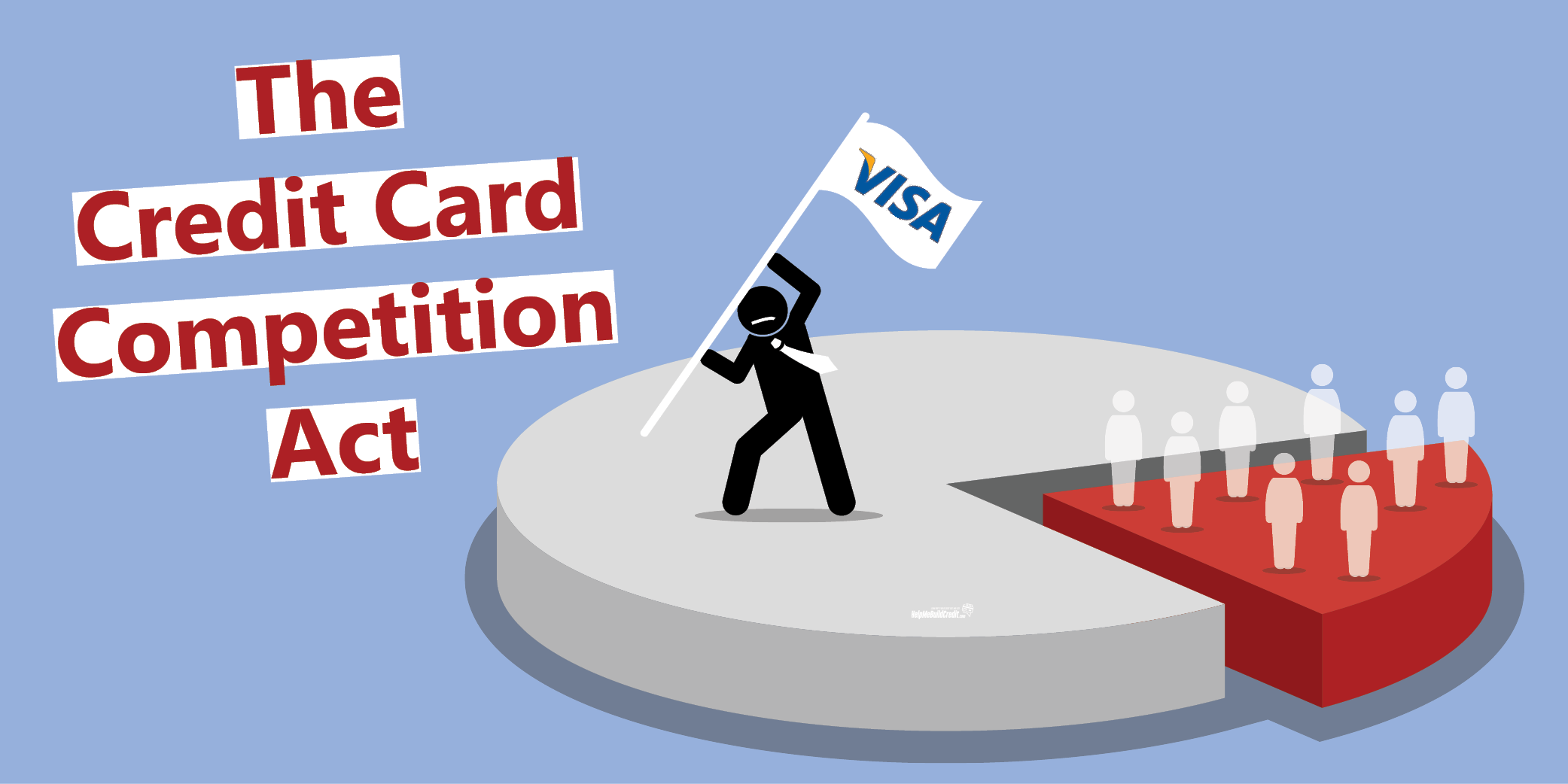This National Small Business Week, we’re taking a closer look at the hurdles small businesses face in today’s shaky economic climate. We recently explored how inflation, slumping sales, rising labor costs, and regulations are pushing small business confidence to record lows.
Let’s delve into one proposed regulation that seems to favor both small businesses and consumers, but might have unforeseen drawbacks: federal regulations on credit card swipe fees.
Concept of Credit Card Competition Act?
In 2022, Senators Roger Marshall, R-Kan., and Richard Durbin, D-Ill., jointly introduced the Credit Card Competition Act, which struggled to gain momentum, even as they attempted to attach it as an amendment to the 2022 National Defense Authorization Act.
Fast forward to June 7, 2023, and Marshall and Durbin are back at it again, reintroducing the bill at a press conference. This time around, they’re joined by Senators Peter Welch, D-Vt., and J.D. Vance, R-Ohio, along with Representatives Lance Gooden, R-Texas, and Zoe Lofgren, D-Calif.
The proposed legislation, as the name suggests, seeks to infuse more competition into the credit card industry, particularly aimed at reducing the fees merchants incur when processing credit card transactions.
If passed into law, the Credit Card Competition Act would amend the Electronic Fund Transfer Act to mandate that credit card-issuing banks provide a minimum of two networks for merchants processing electronic credit card transactions. Notably, it would prohibit Visa and Mastercard, the current giants in the market, from being the only available networks.
The bill, also known as the Durbin-Marshall Credit Card Competition Act (Credit Card Competition Act), is presented as a remedy to the heightened inflation experienced under the Biden administration. It’s worth remembering that inflation surged in mid-2021 following decades of relatively stable levels around 2%, partly due to significant federal spending during the pandemic recovery.

Proponents of the bill argue that credit card swipe fees, often seen as a contributor to inflation, are a key concern. However, critics contest this notion, highlighting that these fees have long been part of the financial landscape.
Nevertheless, if enacted, the Credit Card Competition Act would mandate that financial institutions with assets exceeding $100 billion offer at least two credit card networks for processing transactions, with at least one alternative to Visa/Mastercard.
Supporters anticipate that increased competition in credit card processing will lead to lower fees, benefiting both consumers and small businesses. However, skeptics doubt whether these savings would indeed trickle down to end-users.
Click here to check out Credit Calculators.
Proposed Legislation Aims to Enhance Competition and Reduce Transaction Fees in Payment Processing
A new bill seeks to build upon previous initiatives aimed at curbing transaction fees imposed on merchants, drawing from provisions outlined in the Dodd-Frank Wall Street Reform and Consumer Protection Act. The legislation underscores the necessity for merchants to have access to multiple unaffiliated debit card networks for routing transactions, a mandate established within Dodd-Frank.
One of the pivotal elements introduced by Dodd-Frank was the Durbin Amendment, which established a fixed fee on debit card transaction processing, replacing the previous practice of charging fees based on a percentage of the total transaction. This shift had significant implications, particularly in curbing the rewards banks could offer for debit card purchases, essentially diminishing most perks previously enjoyed by consumers.
The proponents of this bill argue that it will foster greater Credit Card Competition Act competition within credit card exchanges, particularly targeting the dominance of Visa and Mastercard in the realm of general-purpose credit cards. They assert that by introducing measures to reduce swipe fees, both merchants and consumers stand to benefit from decreased costs associated with payment processing.
In essence, the proposed legislation aims to enhance competition within the payment processing landscape while simultaneously striving to alleviate the financial burdens imposed by transaction fees on merchants and consumers alike.
Potential Ramifications of the Credit Card Competition Act on Small Businesses: A Closer Look
The Comprehensive Credit Card Accountability, Responsibility, and Disclosure Act (Credit Card Competition Act) is poised to bring significant changes to the landscape of credit card transactions, potentially impacting small businesses in profound ways. While the intentions behind the legislation may be noble, its implementation could spell trouble for smaller enterprises.
One of the primary concerns revolves around the requirement for banks to work with two payment networks, introducing additional costs into the credit card processing ecosystem. These costs are likely to be passed on to consumers and small businesses, who may find themselves bearing the brunt of higher fees.

Small businesses, in particular, stand to lose out in two significant ways:
- End of Credit Card Rewards Programs: Many small businesses leverage credit card rewards to bolster their operations, reinvesting the benefits accrued from specific cards back into their ventures. The estimated loss of over $12 billion in such benefits could deal a severe blow to these businesses, as credit card companies streamline their operations to cut costs.
- Reduction in Credit Availability: With banks seeking to mitigate the impact of increased processing costs, some small businesses may find their access to credit curtailed. This could hinder their ability to fund growth initiatives or manage cash flow effectively, potentially stunting their development.
While the proposed regulations may aim to level the playing field and enhance transparency in the credit card industry, the reality is that the scales may tip against small businesses. Larger enterprises, with their resources and bargaining power, stand to navigate these changes more adeptly, potentially exacerbating the disparity between small and large businesses.
In conclusion, while the Credit Card Competition Act may offer certain benefits and protections for consumers, its repercussions on small businesses warrant careful consideration. Without adequate provisions to address the challenges they may face, these enterprises could find themselves at a distinct disadvantage in an already competitive marketplace.
Addressing Small Business Concerns: Balancing Inflation and Regulatory Policy
Inflation remains a primary concern for small businesses, which serve as the backbone of the nation’s economy. To alleviate their burdens, Congress must diligently consider avenues for cost reduction. However, any policy mandating new credit card processing requirements could exacerbate rather than alleviate these concerns.
Implementing such regulations is comparable to pouring sugar into the engine of economic growth. While the intention may be to streamline processes or reduce costs, the unintended consequences could significantly impede the vitality of small enterprises.
One potential repercussion is the reduction in credit card rewards and access to credit. For small businesses, these incentives and lines of credit are often vital for sustaining operations, managing cash flow, and facilitating growth. By restricting or altering these benefits, policymakers risk leaving small enterprises in a worse position than before, hindering their ability to navigate the challenges posed by inflation.
Instead of imposing additional burdens, Congress should explore alternative avenues to support small businesses in the face of inflationary pressures. This might include targeted tax relief, access to low-interest loans, or investment in infrastructure to reduce operational costs.
In conclusion, while addressing inflation is a critical priority, policymakers must exercise caution to avoid inadvertently harming the very businesses they aim to assist. Mandating new credit card processing requirements may seem like a solution, but it could ultimately prove detrimental to the economic engine driven by small enterprises. By pursuing thoughtful and comprehensive strategies, Congress can better serve the needs of small businesses while navigating the complexities of inflationary challenges.
Source: https://www.iwf.org/2024/05/01/credit-card-competition-act-small-businesses/
https://thepointsguy.com/news/credit-card-competition-act/
To read more articles, visit credit calculators.







